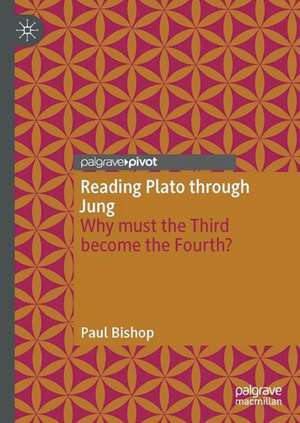Reading Plato through Jung: Why must the Third become the Fourth?
Autor Paul Bishopen Limba Engleză Hardback – 21 ian 2023
This book examines the Jungian imperative that the Third must become the Fourth through the lens of Carl Jung’s complex reception of Plato. While in psychoanalytic discourse the Third is typically viewed as an agent that brings about healing, the author highlights that, in the case of Jung, an early emphasis on the Third as the “transcendent function” gave way to an increasing insistence on the importance of the Fourth. And yet, he asks, why must “the Third become the Fourth”?
Paul Bishop begins with a survey of work on Jung’s relation to Plato, before turning to Jung’s readings of the Timaeus and Black Books, as well as Goethe’s Faust II and Nietzsche’s Zarathustra. He proceeds to unpick Jung’s statements on the Third and the Fourth though a compelling analysis of how Jung draws upon religious and alchemical traditions, Pythagorean numerology, his own dream-like experiences and Plato’s cosmology. This book will appeal to practitioners and to scholars working in the history of ideas, psychoanalysis, philosophy, and psychoanalytic theory.
Preț: 352.25 lei
Nou
Puncte Express: 528
Preț estimativ în valută:
67.40€ • 70.56$ • 55.77£
67.40€ • 70.56$ • 55.77£
Carte tipărită la comandă
Livrare economică 07-21 aprilie
Preluare comenzi: 021 569.72.76
Specificații
ISBN-13: 9783031168116
ISBN-10: 3031168119
Pagini: 155
Ilustrații: XI, 155 p. 8 illus.
Dimensiuni: 148 x 210 x 17 mm
Greutate: 0.35 kg
Ediția:1st ed. 2022
Editura: Springer International Publishing
Colecția Palgrave Macmillan
Locul publicării:Cham, Switzerland
ISBN-10: 3031168119
Pagini: 155
Ilustrații: XI, 155 p. 8 illus.
Dimensiuni: 148 x 210 x 17 mm
Greutate: 0.35 kg
Ediția:1st ed. 2022
Editura: Springer International Publishing
Colecția Palgrave Macmillan
Locul publicării:Cham, Switzerland
Cuprins
Chapter 1: Introduction: Psychoanalysis and the Problem of the Third and the Fourth.- Chapter 2: Jung’s Reading of Plato and the Timaeus.- Chapter 3: Jung on the doctrine of the Trinity.- Chapter 4: The Timaeus and Cosmology; the Third and the Fourth in Alchemy and Synchronicity.- Chapter 5: Conclusion.
Notă biografică
Paul Bishop is William Jacks Chair of Modern Languages at the University of Glasgow, UK. His previous publications include Carl Jung (2014), Ludwig Klages and the Philosophy of Life: A Vitalist Toolkit (2018), German Political Thought and the Discourse of Platonism (2019), and Nietzsche’s “The Anti-Christ”: A Critical Introduction and Guide (2022).
Textul de pe ultima copertă
“Crafted with Bishop’s usual assiduity and delightful style, this book provides much needed clarification of Jung’s complex relation to Plato, and Jung’s cryptic accounts of the Third and the Fourth.”
—Lucy Huskinson, Professor, Bangor University, UK.
“Bishop’s masterful analysis [reveals] a key to understanding the real-world significance and ethical challenge of Jung’s entire clinical and cultural thought."
—Roderick Main, Professor, University of Essex, UK.
“This is a book brimming with original ideas and new connections […]. I highly recommend this to anyone interested in the living legacy of Platonic thought and its influence on depth psychology.”
—Phil Goss, Associate Professor, University of Warwick, UK, and Jungian Analyst.
This book examines the Jungian imperative that the Third must become the Fourth through the lens of Carl Jung’s complex reception ofPlato. While in psychoanalytic discourse the Third is typically viewed as an agent that brings about healing, the author highlights that, in the case of Jung, an early emphasis on the Third as the “transcendent function” gave way to an increasing insistence on the importance of the Fourth. And yet, he asks, why must “the Third become the Fourth”?
Paul Bishop begins with a survey of work on Jung’s relation to Plato, before turning to Jung’s readings of the Timaeus and Black Books, as well as Goethe’s Faust II and Nietzsche’s Zarathustra. He proceeds to unpick Jung’s statements on the Third and the Fourth though a compelling analysis of how Jung draws upon religious and alchemical traditions, Pythagorean numerology, his own dream-like experiences and Plato’s cosmology. This book will appeal to practitioners and to scholars working in the history of ideas, psychoanalysis, philosophy,and psychoanalytic theory.
Caracteristici
Examines the relationship of Jung’s work to Plato’s Unpicks Jung’s statements about the Third and the Fourth Offers new insights for practitioners and scholars of psychoanalysis, history, philosophy and German literature
